Text
i guess my country banned tumblr??? i can only access here with vpn....
1 note
·
View note
Text
German and French Cozy Winter Vocabulary

(Day 6/50 days of immersion : original post here)
As usual the vocabulary is in German - French - English
In the French vocab : (f) means the word is feminine, (m) that it’s masculine. It’s only noted as such when the gender of the word can’t be deduced from the article (”la” or “le”)
die heiße Schokolade - le chocolat chaud - the hot chocolate
die Decke - la couverture - the blanket
das Marshmallow - le marshmallow - the marshmallow
die Socke - la chaussette - the sock
bequem - confortable - comfortable
der Schal - l'écharpe (f) - the scarf
der Reif - le givre - the frost
der Schnee - la neige - the snow
das Buch - le livre - the book
der Mantel - le manteau - the coat
die SchneeFlocke - le flocon de neige - the snowflake
der Schlitten - la luge - the toboggan (UK) / The sled (US)
die Kerze - la bougie - the candle
der Plüschbär - l'ours (m) en peluche - the teddy bear
die Lichterkette - la guirlande lumineuse - the fairy lights
die Tasse Tee - la tasse de thé - the cup of tea
warm - chaud - warm
kalt - froid - cold
der Nachtisch - le dessert - the dessert
warm / herzlich - chaleureuse (f), chaleureux (m) - warm / friendly
der Schlafanzug - le pyjama - the pajamas (US) / the pyjama (UK)
das Wollmützchen - le bonnet de laine - the wooly hat
die Winterkleidung - les vêtements (m) d'hiver - the winter clothes
der Keks - le biscuit - the biscuit (UK) / the cookie (US)
der Schneemann - le bonhomme de neige - the snow man
As usual, if something can be improved, feel free to tell me :)
270 notes
·
View notes
Text
starting to think the amount of sleep you get has an impact on how much energy you have the next day. i’ll investigate more and get back to you
137K notes
·
View notes
Text
I realised that my entries are so weird, one day im like "yay im on back on track!! studying feels like a game and i feel like life is worth living again" and its a 5 hours study session, then i forget that i have this account for a week and came back like "hi guys its me again i had mental breakdowns and almost died but i studied regardless, it was okay" and its one of the hardest weeks of my life with average 8+ study sessions a day
#lmaoooooooo#we gotta do what we gotta do#unfortunately#my studies better pay off#studyblr#studyspo#study tips#studying
6 notes
·
View notes
Text
fucking hate it when the stuff everybody says "actually works" does actually work.
hate exercising and realizing i've let go of a lot of anxiety and anger because i've overturned my fight-or-flight response.
hate eating right and eating enough and eating 3 times a day and realizing i'm less anxious and i have more energy
hate journaling in my stupid notebook with my stupid bic ballpoint and realizing that i've actually started healing about something once i'm able to externalize it
hate forgiving myself hate complimenting myself more often hate treating myself with kindness hate taking a gratitude inventory hate having patience hate talking to myself gently
hate turning my little face up to the sun and taking deep breaths and looking at nature and grounding myself and realizing that i feel less burdened and more hopeful, more actually-here, that i am able to see the good sides of myself more clearly, that i am able to see not only how far i have to grow - but also how much growth i have already done & how much of my life i truly fill with light and laughter and love
horrible horrible horrible. hate it but i'm gonna do it tho
272K notes
·
View notes
Text
kinda forgot that i have this account 😭😭
i was having a hard time with motivation and studying but its okay now. Today was pretty impressive, i didnt know i could study that much.


12 notes
·
View notes
Text
Ever since I was a little girl I’ve loved information
66K notes
·
View notes
Text


I wasnt able to study as much as i want because i was feeling bad and i didnt know why, so it was a little bit disappointing but i reviewed some biology topics and did some ancient greek - turkish/turkish - ancient greek sentence translations so a win is a win...!
Studying ancient greek with this song was so therapeutic, i love it
11 notes
·
View notes
Text



I'm finally getting on track and it makes me really happy!
Today I didnt do a lot but it was structured and I think that's the most important thing about my studies. I need to follow a plan or else i feel like im totally lost. ㅜㅜ
I studied chem and a little maths, reviewed the chapters i studied before. Re-remembering the old information feels good. I also studied a little bit German (I need it to pass my grade even though i dont like it ㅜㅜ) and continiued to read the book about ADHD. It contains a lot of interesting information so i decided to keep a google document for it.
Studying in 3 different languages made my brain jelly, i hope i didnt make any mistakes while writing this post :')
#i better go sleep or i wont be able to wake up#studyblr#studyspo#study tips#study motivation#studying#dark academia#spotify#science
21 notes
·
View notes
Text
how I take notes on non fiction books
I recently made a post on my study method, and decided to make a whole separate post on my note taking method. The structure of the notes I write doesn't vary too much from my lecture notes to things I might have to read. A couple of useful informations you might want to know before I start actually talking about note writing is that I am mainly focused on studying history (tho I have had other humanities exams in my degrees), and that I study for oral exams in which the material is mainly composed of non fiction books, but sometimes include articles as well as lecture notes. Somehow I have also failed to mention that I am speaking about HANDWRITTEN NOTES. I only do handwritten notes, I don't work well digitally, so keep that in mind. And with this being said brace yourselves for a very long post. The bullet points I will be making are not really in a specific order and I will be including a few pictures too.
The first step when I am working on the materials for an exam is to figure out in which order I will be reading (and writing notes) the books. This hasn't really much to do with the notes themselves, but it's important to know which of your materials is more general and what other things go more in depth, so that you don't struggle too much while studying. Another plan related thing I always do is to write down each chapter of the book I have to study on my bullet journal and how many pages it is so I can plan my studying more comfortably. If the chapters are very long, and divided in subchapters I sometimes also write those down.
The goal of the notes I write is to fully take the place of the book, so they tend to be very detailed and long. I do this because the very act of writing is part of my study method, and working on things I have written down in my own words is just much better for the type of learner I am. So basically I read the book only once, then it goes back on the shelf and I work exclusively on the notes. This means my notes need to be detailed and well organized.
My method is to read a chapter, underlining important stuff as I am reading, and then right after I am done reading I work on the notes for that chapter before moving onto the next. I do this because it makes the note writing more effortless, I am fresh with informations I just read and I basically just need to skim over what I have underlined.
On underlining, since it is so important. I underline everything I will be including in my notes, it might seem much as sometimes it consists of full paragraphs, instead of key words. But this is okay because my notes I don't just copy and paste.
To create useful notes you need to be re-elaborating the informations. You need to read, understand what you read, and be able to write it down using your own words. That way the notes will be easier to review, they will often be composed of shorter sentences, and by doing so you are also actively making writing part of your studying and not just a mindless activity.
Personally I don't work well with full pages summaries, I need the text to be visually broken into sentences/small paragraphs, and I use a lot of symbols as well as abbreviations.
Symbols and abbreviations are in a way part of your very own language when you are writing notes, you tend to develop these with time, but they are so useful. I personally use different types of arrows, all caps words, position of the text in the page, different methods of highlighting and abbreviations (usually for words that come up often like country names, for example Italy becomes ita, France becomes fr, etc.).
Your notes need to be useful for you, they don't have to necessarily be comprehensible for another person (which means you can and will fuck up sentence structure because sometimes skipping a couple of words makes the notes shorter and still understandable), and they do not have to be pretty. They should be as tidy as possible, but again that might change from person to person, I have some very messy looking notes that make total sense to me. With time you'll learn what works best for you.
I have a visual memory so as I mentioned titles, highlighters, all caps, the placement on the page and other similar things are very important in my notes. I cannot fully exapain some of these things because some definitely only make sense to me in the moment (like the words I choose to write in all caps, or the way I highlight things).
I like to have a clear chapter and subchapter break (so that in case I need to refer back to the book it's super effortless). I like to write those with a red pen, usually the chapter title is in all caps and the subchapter in coursive, but it really depends.
I use only two highlighters in each set of notes yellow for dates, and the colour I associate with the book/the subject of the book (I have synesthesia I don't make the rules when it comes to colours). This of course might change depending your preferences and on the element of your notes you want to focus on. I like to have spacific colour for dates and time periods, because of course while studying history that is a fundamental element. If you are focusing on other subjects you might want to have a specific colour for names, or other elements.
I like to leave a big side margin to add either key words (especially in lecture notes since they might be messier and jump around informations more often), or additional information in a second time (sometimes it happens, after you read another book, or attended a particular lecture you have to add a couple of sentences and I rather have a blank space that never gets used rather than no space at all for emergencies).
I honestly mentioned everything that came to mind right away, but since note writing is now basically a mindless skill I have been practicing for years I surely forgot about something. I might end up adding to this post in the future or write another one. My note-writing method has also changed a lot thought the years from high school to university, it's a skill I have been perfecting for the past decade. This to say that depending on what you are working on things might change, and by experimenting with different things you might find out things that work very well for you. If you have any questions on specific things I didn't mention or that wen't clear my inbox is always open and I am more than happy to help.
Since this post is already very very long I am adding the pictures below the cut
Example of a page of notes before and after highlighting
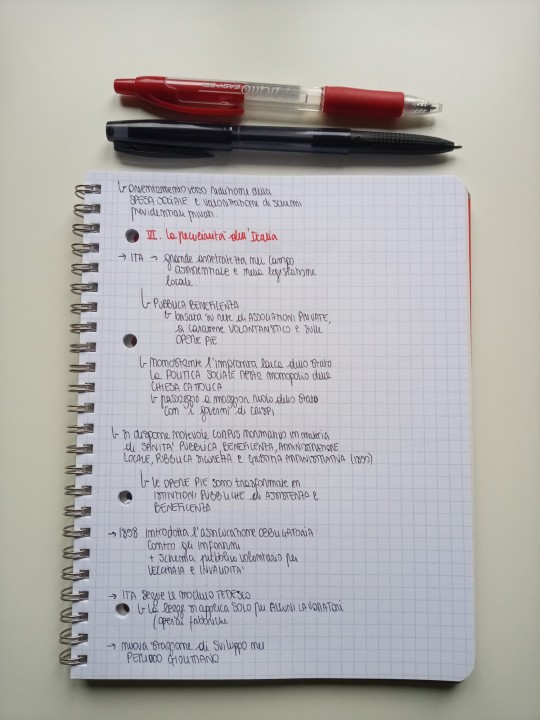
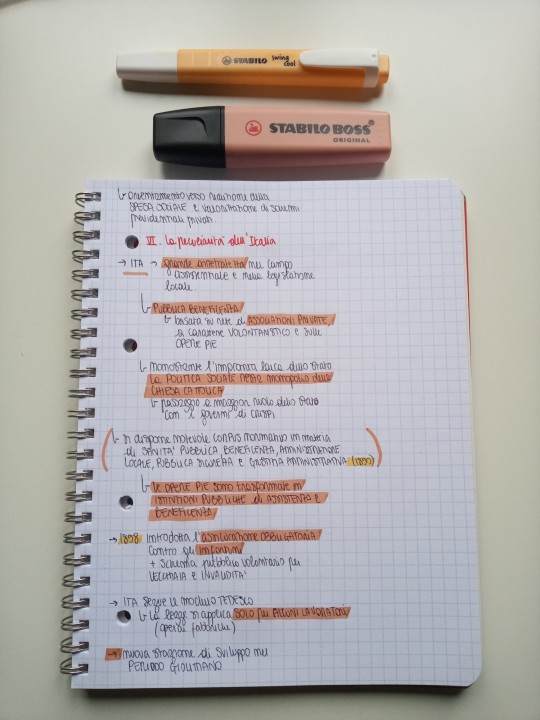
Example of symbols and structure of the notes and the way I highlight things (in which you'll hopefully be able to understand my handwriting, and in which there might be some spelling errors but alas that often happens in my real notes as well so if there are any it's for the sake of accuracy lmao). If I end up adding informations on the margins I always use a pen of a different color so I can tell which informations I got from what source (ex. main notes from lecture, colorful notes from additional article).
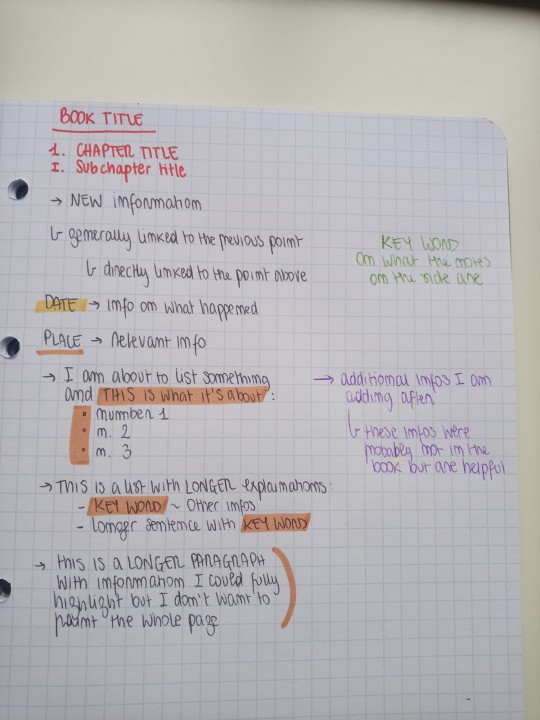
Example of messier notes in which the main text in black are the notes I took during lectures and the additional colorful text was added while writing the materials (I rarely do this, it usually happens when the lectures follow a book precisely, which happens when we have to study books or summaries written by the professor). As you can see I often use post it notes to add more writing space, and sometime I even use them to create visually separated sections. If I end up adding some drawings I also usually like to have them on post it notes so they stand out more (and if you are wondering why the hell would an history student need drawings it's usually either because I need a map or a region/state to mark things out, or when studying for archaeology exams I often needed visual references, for example to identify different types of vases or decorations).
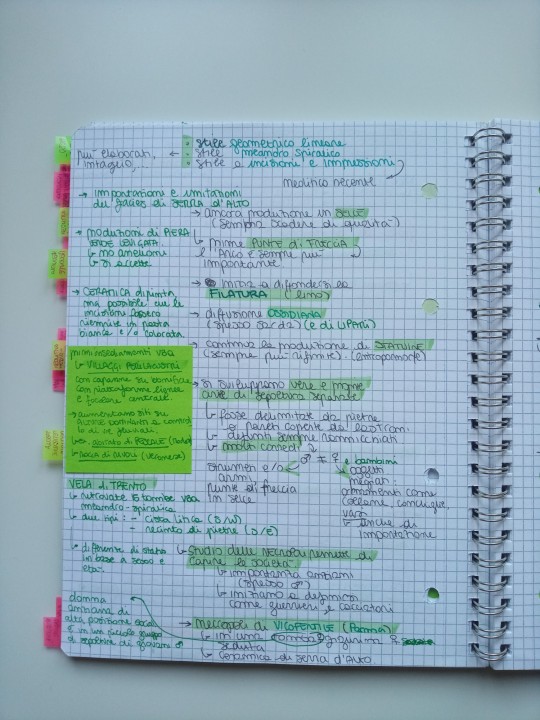
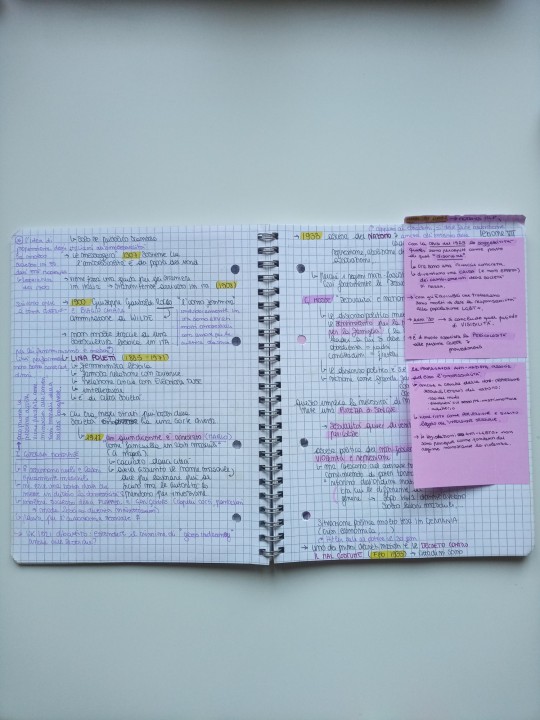
237 notes
·
View notes
Text


It's been snowing since yesterday night and i couldnt be happier. I really love snow ㅜㅜ It's really cold and I didnt want to stay at dorm so i came to a cafe with my friend to study. I definetly needed that hot chocolate..
Since I didnt do yesterday, I will at least study physics, chem and biology today.
I'm aware that its not Christmas season yet but i love listening to these songs when it snows so bare with me please ㅜㅜ
#studyblr#study tips#studyspo#study motivation#studying#dark academia#spotify#science#study aesthetic#snow
37 notes
·
View notes
Text
Okay, so:
Latin has this word, sic. Or, if we want to be more diacritically accurate, sīc. That shows that the i is long, so it’s pronounced like “seek” and not like “sick.”
You might recognize this word from Latin sayings like “sic semper tyrannis” or “sic transit gloria mundi.” You might recognize it as what you put in parentheses when you want to be pass-agg about someone’s mistakes when you’re quoting them: “Then he texted me, ‘I want to touch you’re (sic) butt.’”
It means, “thus,” which sounds pretty hoity-toity in this modren era, so maybe think of it as meaning “in this way,” or “just like that.” As in, “just like that, to all tyrants, forever,” an allegedly cool thing to say after shooting a President and leaping off a balcony and shattering your leg. “Everyone should do it this way.”
Anyway, Classical Latin somewhat lacked an affirmative particle, though you might see the word ita, a synonym of sic, used in that way. By Medieval Times, however, sic was holding down this role. Which is to say, it came to mean yes.
Ego: Num edisti totam pitam?
Tu, pudendus: Sic.
Me: Did you eat all the pizza?
You, shameful: That’s the way it is./Yes.
This was pretty well established by the time Latin evolved into its various bastard children, the Romance languages, and you can see this by the words for yes in these languages.
In Spanish, Italian, Asturian, Catalan, Corsican, Galician, Friulian, and others, you say si for yes. In Portugese, you say sim. In French, you say si to mean yes when you’re contradicting a negative assertion (”You don’t like donkey sausage like all of us, the inhabitants of France, eat all the time?” “Yes, I do!”). In Romanian, you say da, but that’s because they’re on some Slavic shit. P.S. there are possibly more Romance languages than you’re aware of.
But:
There was still influence in some areas by the conquered Gaulish tribes on the language of their conquerors. We don’t really have anything of Gaulish language left, but we can reverse engineer some things from their descendants. You see, the Celts that we think of now as the people of the British Isles were Gaulish, originally (in the sense that anyone’s originally from anywhere, I guess) from central and western Europe. So we can look at, for example, Old Irish, where they said tó to mean yes, or Welsh, where they say do to mean yes or indeed, and we can see that they derive from the Proto-Indo-European (the big mother language at whose teat very many languages both modern and ancient did suckle) word *tod, meaning “this” or “that.” (The asterisk indicates that this is a reconstructed word and we don’t know exactly what it would have been but we have a pretty damn good idea.)
So if you were fucking Ambiorix or whoever and Quintus Titurius Sabinus was like, “Yo, did you eat all the pizza?” you would do that Drake smile and point thing under your big beefy Gaulish mustache and say, “This.” Then you would have him surrounded and killed.
Apparently Latin(ish) speakers in the area thought this was a very dope way of expressing themselves. “Why should I say ‘in that way’ like those idiots in Italy and Spain when I could say ‘this’ like all these cool mustache boys in Gaul?” So they started copying the expression, but in their own language. (That’s called a calque, by the way. When you borrow an expression from another language but translate it into your own. If you care about that kind of shit.)
The Latin word for “this” is “hoc,” so a bunch of people started saying “hoc” to mean yes. In the southern parts of what was once Gaul, “hoc” makes the relatively minor adjustment to òc, while in the more northerly areas they think, “Hmm, just saying ‘this’ isn’t cool enough. What if we said ‘this that’ to mean ‘yes.’” (This is not exactly what happened but it is basically what happened, please just fucking roll with it, this shit is long enough already.)
So they combined hoc with ille, which means “that” (but also comes to just mean “he”: compare Spanish el, Italian il, French le, and so on) to make o-il, which becomes oïl. This difference between the north and south (i.e. saying oc or oil) comes to be so emblematic of the differences between the two languages/dialects that the languages from the north are called langues d’oil and the ones from the south are called langues d’oc. In fact, the latter language is now officially called “Occitan,” which is a made-up word (to a slightly greater degree than that to which all words are made-up words) that basically means “Oc-ish.” They speak Occitan in southern France and Catalonia and Monaco and some other places.
The oil languages include a pretty beefy number of languages and dialects with some pretty amazing names like Walloon, and also one with a much more basic name: French. Perhaps you’ve heard of it, n'est-ce pas?
Yeah, eventually Francophones drop the -l from oil and start saying it as oui. If you’ve ever wondered why French yes is different from other Romance yeses, well, now you know.
I guess what I’m getting at is that when you reblog a post you like and tag it with “this,” or affirm a thing a friend said by nodding and saying “Yeah, that”: you’re not new
48K notes
·
View notes
Text

Yesterday I took my Ancient Greek midterm and I'm finally free. I also spent time with one of my closest online friends. She came to my city and even she couldnt stay for a long time, it was still so good to see her.
I didnt study today, I decided to read books and relax for a little before locking in. I just finished reading The Man Who Mistook His Wife as a Hat (It was really good) and now I'm reading a book about ADHD in adulthood.
21 notes
·
View notes
Text
my midterms are almost over!! (i still haven't take the Ancient Greek midterm but i know it wont be hard so im not stresful anymore) and that means i can go back to my personal studies. I'm finally free!!! Today I'll study a lot because i've missed studying what i love sooo much.
#midterm weeks are TORTURE#well at least its over#gonna pretend like i dont have finals because ignorance is bliss#studying#studyblr#studyspo
6 notes
·
View notes
Text

my midterms are still hasn't ended and i miss my personal studies so much...
After the translation exam, i had a civilisation history midterm and it was okay. I couldnt remember everything but i will probably pass, so it's fine. I have 4 more exams to go: reading skills, turkish, german linguistics and ancient greek. Honestly ancient greek is the hardest for me but its also very entertaining so no worries lol. I should study a lot on the weekend :')
#studyblr#studyspo#study tips#study motivation#studying#my period cramps are killing me#send help#i really have a love hate relationship with german#mostly hate tho
11 notes
·
View notes












